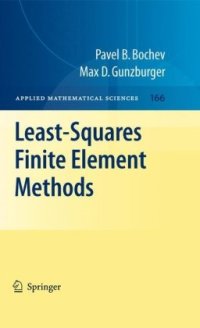
Ebook: Least-Squares Finite Element Methods
- Genre: Mathematics
- Tags: Engineering Fluid Dynamics, Calculus of Variations and Optimal Control, Optimization, Computational Mathematics and Numerical Analysis
- Series: Applied Mathematical Sciences 166
- Year: 2009
- Publisher: Springer-Verlag New York
- City: New York
- Edition: 1
- Language: English
- djvu
The book examines theoretical and computational aspects of least-squares finite element methods(LSFEMs) for partial differential equations (PDEs) arising in key science and engineering applications. It is intended for mathematicians, scientists, and engineers interested in either or both the theory and practice associated with the numerical solution of PDEs.
The first part looks at strengths and weaknesses of classical variational principles, reviews alternative variational formulations, and offers a glimpse at the main concepts that enter into the formulation of LSFEMs. Subsequent parts introduce mathematical frameworks for LSFEMs and their analysis, apply the frameworks to concrete PDEs, and discuss computational properties of resulting LSFEMs. Also included are recent advances such as compatible LSFEMs, negative-norm LSFEMs, and LSFEMs for optimal control and design problems. Numerical examples illustrate key aspects of the theory ranging from the importance of norm-equivalence to connections between compatible LSFEMs and classical-Galerkin and mixed-Galerkin methods.
Pavel Bochev is a Distinguished Member of the Technical Staff at Sandia National Laboratories with research interests in compatible discretizations for PDEs, multiphysics problems, and scientific computing.
Max Gunzburger is Frances Eppes Professor of Scientific Computing and Mathematics at Florida State University and recipient of the W.T. and Idelia Reid Prize in Mathematics from the Society for Industrial and Applied Mathematics.
This book offers a thorough and systematic examination of theoretical and computational aspects of least-squares finite element methods. The range of topics spans formal mathematical analysis and framework for least squares methods, application of this framework to concrete partial differential equations and discussion of the computational properties of the methods.
The abstract least-squares framework will help readers navigate the realm of least-squares methods while the many numerical examples provide a valuable practical guide to these methods. Most of the necessary background material is contained in several appendices.
Chapter summaries and detailed illustrations are included . Graduate students and computational science researchers will find this book useful.